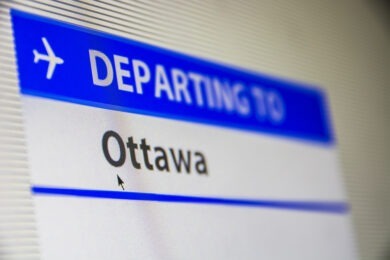Updated 3/9/17 4:46 PM
Hawaii’s lawsuit against President Trump’s travel ban has gained some new supporters.
Washington state has announced that it intends to renew its request to block the executive order. Washington was the first state to sue after the original travel ban was signed. Its actions led Seattle Judge James Robart to stop the law’s implementation.
The Washington Post reports that New York, Massachusetts, Oregon and Minnesota are also joining the cause.
Hawaii’s new travel ban lawsuit is just the latest salvo in President Trump’s ongoing executive order saga.
On Wednesday, U.S. District Court Judge Derrick Watson set a hearing for March 15, the day before the new travel ban is to take effect. The judge also allowed the state to revise its original lawsuit, which it filed in January when Trump issued the first executive order to block travelers from Syria, Iraq, Iran, Libya, Somalia, Sudan and Yemen from entering the United States.
“The executive order … keeps Hawaii families apart,” said Hawaii Attorney General Doug Chin in a widely reported news conference announcing the lawsuit. “It blocks Hawaii residents from traveling; it harms Hawaii’s tourism industry; it establishes a religion in Hawaii in violation of the Constitution; it blocks Hawaii businesses and universities from hiring as they see fit. Most importantly, it degrades the values that Hawaii has worked so hard to protect.”
The revised lawsuit maintains that the new travel ban issued Monday is unconstitutional and seeks a temporary restraining order.
Business travel impact
Hawaii isn’t the only one taking an active stance. The Global Business Travel Association (GBTA) followed its statement on Trump’s new travel ban with a poll this week forecasting more losses for the business travel industry.
For meeting planners, the survey is especially troubling. About 17 percent of GBTA’s European members reported that their companies have already canceled business trips to the United States because of the travel bans.
Of those European business travel insiders polled, 45 percent cast doubt over future trips to the United States. Petitions calling for a boycott of U.S. meetings have already drawn thousands of signatures since the first travel ban.
“There is always the risk that closing our borders sends the message that the United States is closed for business,” said Michael W. McCormick in a statement. “And the results of this poll show the perception of the United States as a welcoming destination for business travel has been altered.
“As we always say, security is paramount, but GBTA continues to be a proponent for expanding proven security programs and developing new technology to facilitate information-sharing among governments to ensure travelers are always vetted properly, making us all more safe and secure.”
U.S. tourism’s not-so-sunny outlook
Concerns over the new travel ban aren’t limited to business travel, either. The revised executive order isn’t exactly welcoming for U.S. tourism.
“Unfortunately, it doesn’t appear that the administration fully seized the opportunity to differentiate between the potential security risks targeted by the order and the legitimate business and leisure visitors from abroad who support 15.1 million American jobs,” U.S. Travel Association President and CEO Roger Dow said in a statement.
“Clearly this revised order is very encouraging news if you’re looking to come to the U.S. from Iraq. The question remains whether the revised order did enough to mollify the prospective traveler from Canada, Europe, or elsewhere around the world who may have been put off by the initial travel ban. If undecided voters need to hear certain things to be motivated to get out and vote, then the same is true for undecided travelers.”
In an earlier report, GBTA said the U.S. travel industry lost $185 million in business in the first week after the original executive order.




